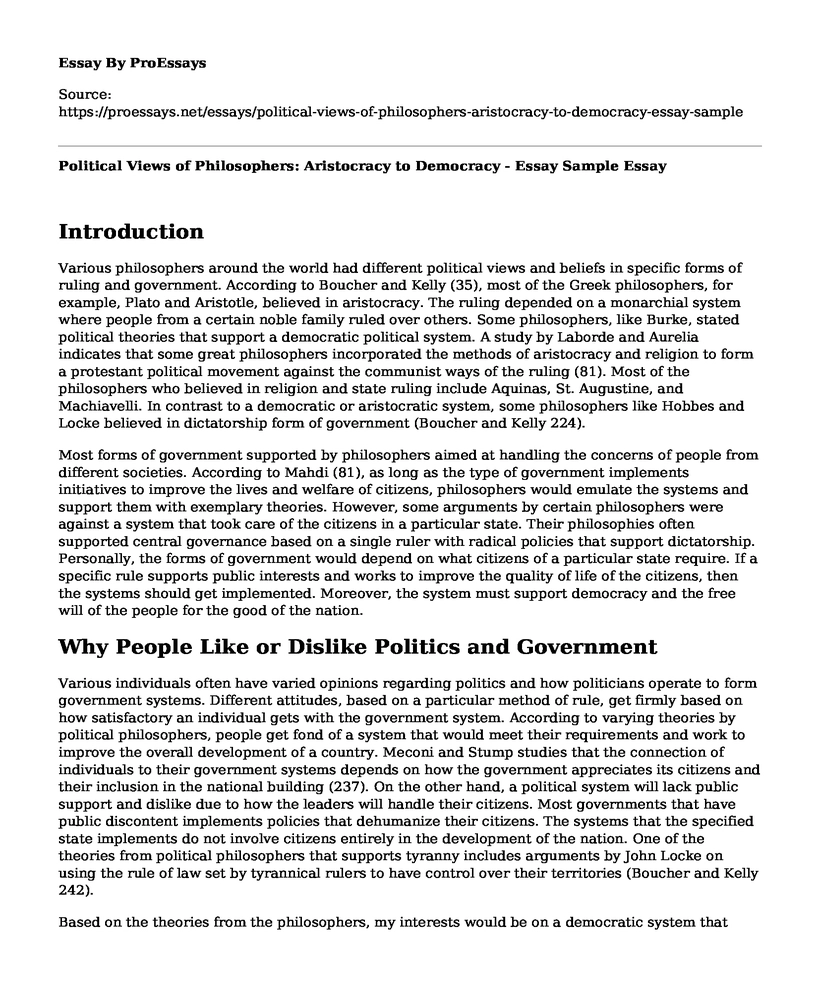Introduction
Various philosophers around the world had different political views and beliefs in specific forms of ruling and government. According to Boucher and Kelly (35), most of the Greek philosophers, for example, Plato and Aristotle, believed in aristocracy. The ruling depended on a monarchial system where people from a certain noble family ruled over others. Some philosophers, like Burke, stated political theories that support a democratic political system. A study by Laborde and Aurelia indicates that some great philosophers incorporated the methods of aristocracy and religion to form a protestant political movement against the communist ways of the ruling (81). Most of the philosophers who believed in religion and state ruling include Aquinas, St. Augustine, and Machiavelli. In contrast to a democratic or aristocratic system, some philosophers like Hobbes and Locke believed in dictatorship form of government (Boucher and Kelly 224).
Most forms of government supported by philosophers aimed at handling the concerns of people from different societies. According to Mahdi (81), as long as the type of government implements initiatives to improve the lives and welfare of citizens, philosophers would emulate the systems and support them with exemplary theories. However, some arguments by certain philosophers were against a system that took care of the citizens in a particular state. Their philosophies often supported central governance based on a single ruler with radical policies that support dictatorship. Personally, the forms of government would depend on what citizens of a particular state require. If a specific rule supports public interests and works to improve the quality of life of the citizens, then the systems should get implemented. Moreover, the system must support democracy and the free will of the people for the good of the nation.
Why People Like or Dislike Politics and Government
Various individuals often have varied opinions regarding politics and how politicians operate to form government systems. Different attitudes, based on a particular method of rule, get firmly based on how satisfactory an individual gets with the government system. According to varying theories by political philosophers, people get fond of a system that would meet their requirements and work to improve the overall development of a country. Meconi and Stump studies that the connection of individuals to their government systems depends on how the government appreciates its citizens and their inclusion in the national building (237). On the other hand, a political system will lack public support and dislike due to how the leaders will handle their citizens. Most governments that have public discontent implements policies that dehumanize their citizens. The systems that the specified state implements do not involve citizens entirely in the development of the nation. One of the theories from political philosophers that supports tyranny includes arguments by John Locke on using the rule of law set by tyrannical rulers to have control over their territories (Boucher and Kelly 242).
Based on the theories from the philosophers, my interests would be on a democratic system that supports its citizens. A system that caters to the needs of the citizens without exclusion of any kind. Contrary, I would dislike any political system that promotes tyranny over a democratic system. Primarily because the tyrannical regime only leads to humiliation of citizens and the systems often do not consider the opinions of citizens in their policies
Works Cited
Boucher, David, and Paul Kelly. Political Thinkers: From Socrates to the Present. Oxford University Press, 2017.
Laborde Cecile, and Bardon Aurelia. Religion in Liberal Political Philosophy. Oxford University Press, 2017.
Mahdi, Mubasher. "Cicero on Constitution, Government, and Ethics." International Journal of English Literature and Social Sciences, vol. 3, no. 1, 2018, pp. 80-87. https://dx.doi.org/10.22161/ijels.3.1.15
Meconi, David Vincent, and Eleonore Stump. The Cambridge Companion to Augustine. Cambridge University Press, 2014.
Cite this page
Political Views of Philosophers: Aristocracy to Democracy - Essay Sample. (2023, Jun 19). Retrieved from https://proessays.net/essays/political-views-of-philosophers-aristocracy-to-democracy-essay-sample
If you are the original author of this essay and no longer wish to have it published on the ProEssays website, please click below to request its removal:
- Essay Sample on Dissociative Identity Disorder
- Essay on Challenge-Free Life
- Ethical Leadership in Business Essay Example
- Essay on Nurse Practitioners: Impact of Regulatory Policies on Advanced Practice Nursing
- Essay Sample on Trump's Presidency: Good News for World Peace?
- Forming Core Beliefs: Moral Values in Society - Essay Sample
- Research Paper Sample on Controlled Substances Act of 1970







